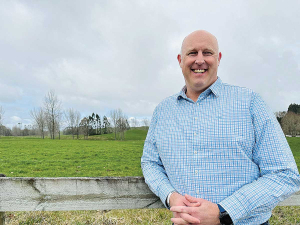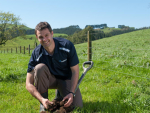His message comes as the company reinforces its long-term commitment to New Zealand dairy farmers, including launching a new brand identity after it was acquired by Farmlands Co-operative from Ballance Agri-Nutrients in May.
Jackson believes the dairy industry is at a pivotal point where nutrition will be crucial to how farmers manage their herds to drive production efficiency and look after the environment. He believes farmers need to shift the way they think about nutrition to remain competitive.
"Our dairy industry needs to approach herd nutrition much like we do the nutrition and health of our soils. We need to understand how improved nutritional strategies can markedly impact the productivity of our crops and pastures. Similarly, we must recognise the significant impact nutrition has on the productivity of our livestock.
"Farmers need to be able to bank on their herd's lactation and reproductive performance, and have confidence they'll produce top-quality milk more efficiently, season after season. Nutrition is a key lever they can pull to achieve these performance gains by optimising the rumen function of their animals.
"It's not about replacing grass, but rather complementing it. Rearing the best calves requires a diet that is high in quality, protein and starch. Keeping cows in the herd for longer means giving them targeted nutrition at critical periods.
"SealesWinslow has been working on the science behind this for more than 50 years, and we will keep working with our farmers as their trusted partners to grow their knowledge and support them to make real gains."
Delivering affordable, quality solutions remains a top priority for the company, especially in light of current economic conditions, he adds.
"Despite some fluctuations in the prices of grains and minerals, overall feed prices have remained stable for about 12 months. We don't expect too much volatility in feed prices in the short term, which is reassuring when farmers are trying to keep production costs down," says Jackson.
"But affordability is not necessarily about simply looking at the lowest cost. More important for farmers is being confident about return on investment and making sure their herd achieves the best production response from supplementary feed.
"Achieving that requires some robust science. That's why we developed our Ruminix decision-making tool - released earlier this year - which helps farmers predict the effects of different feed choices on milk production before purchasing. It's been well received by farmers.
"These types of science-based solutions will help our industry reduce its nitrogen and carbon footprints, lower our emissions, and lift on-farm production effiency. SealesWinslow is proud to be leading the way in that space, and we look forward to more exciting things to come in the near future."
Jackson reassures farmers that despite a new look, the company is committed to delivering the same reliable service and high-quality products they have come to trust.
"It's business as usual, and farmers can continue to buy SealesWinslow's products through all existing merchant channels. We are proud to be here for the long haul."


















